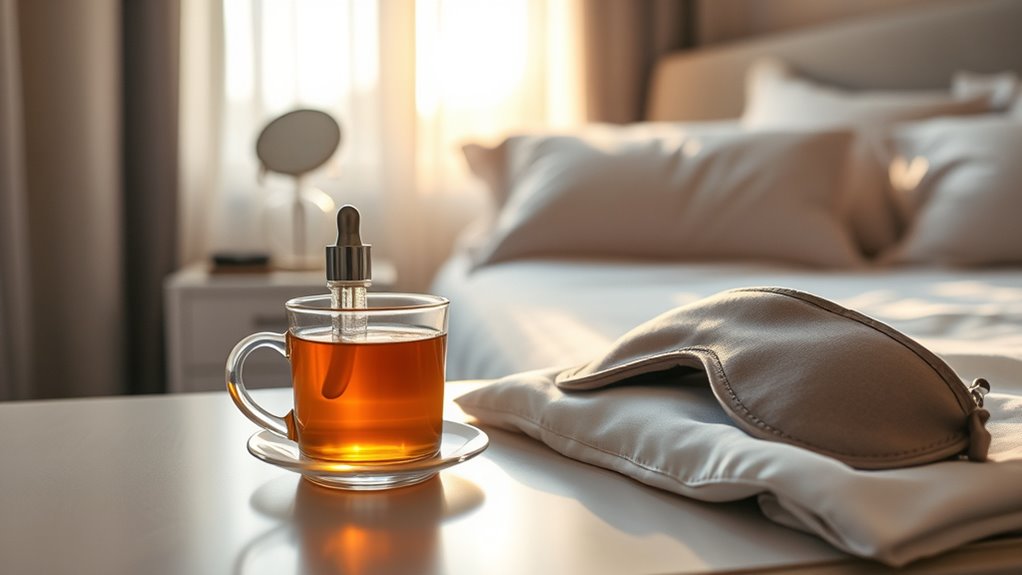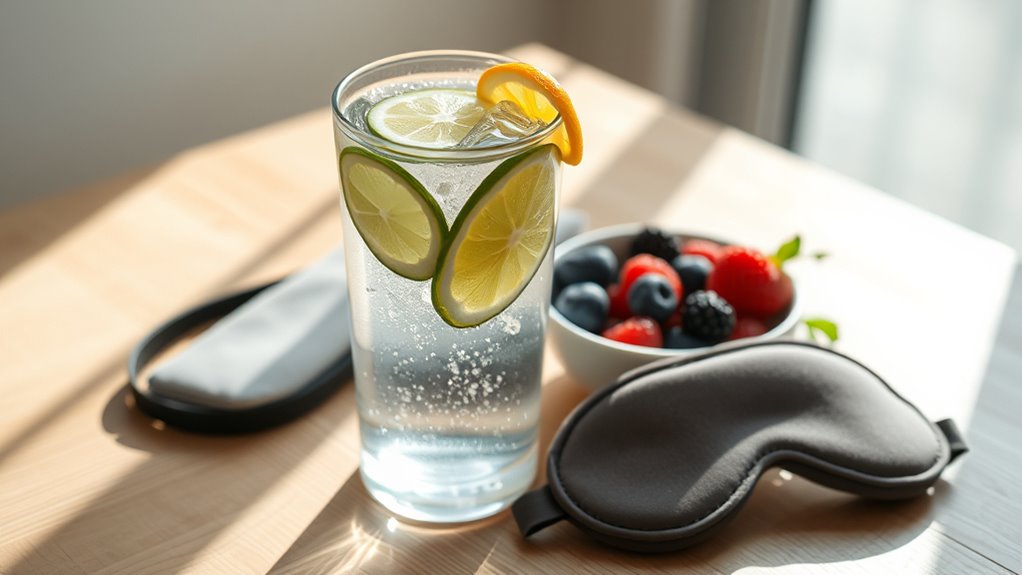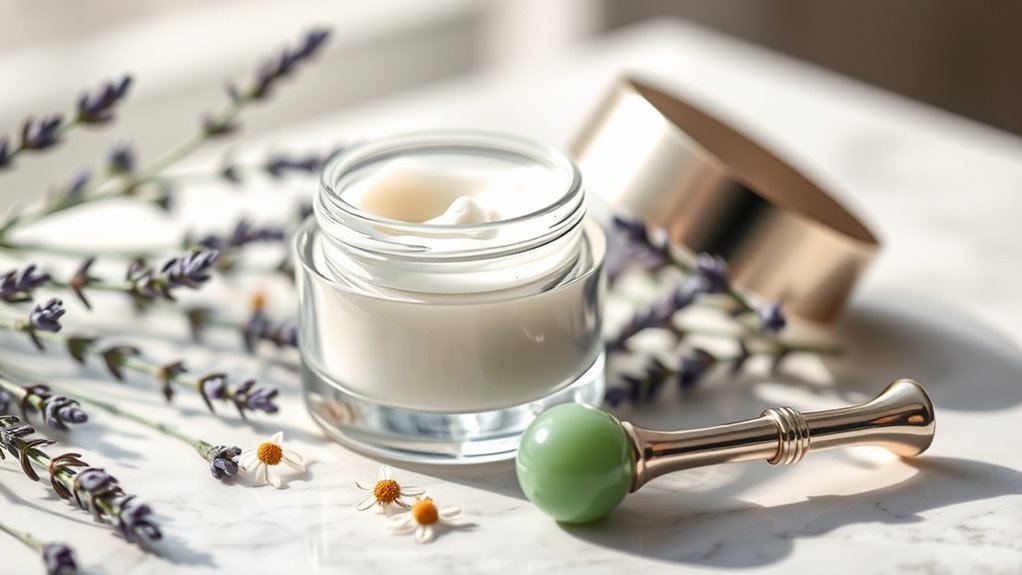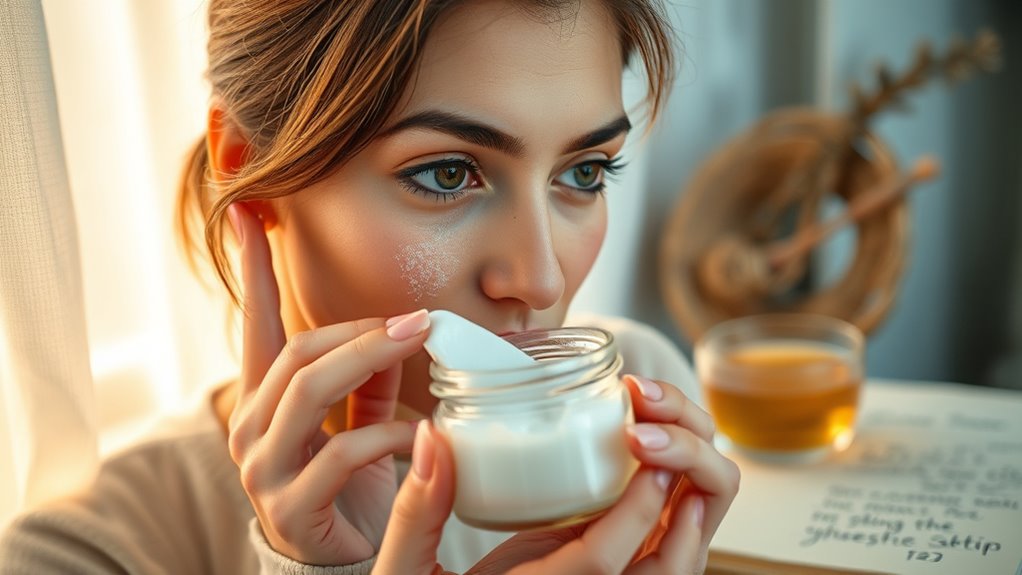To fix puffy eyes and wake up looking refreshed, start by improving your sleep hygiene—aim for 7 to 9 hours and avoid caffeine before bed. Stay hydrated with plenty of water, and consider reducing your sodium intake. Try home remedies like chilled cucumber slices or cooled tea bags to soothe inflammation. Remember, if puffiness persists or symptoms worsen, it might be time to consult a healthcare professional for further guidance on effective treatments.
Key Takeaways
- Maintain a consistent sleep schedule, aiming for 7 to 9 hours of quality sleep each night to reduce under-eye puffiness.
- Stay hydrated by drinking at least 64 ounces of water daily, which helps prevent fluid retention.
- Limit sodium intake to reduce swelling, ideally keeping it under 1,500 mg per day for best results.
- Apply chilled cucumber slices or cooled tea bags for 10 to 15 minutes to soothe and reduce inflammation in puffy eyes.
- Elevate your head with an extra pillow while sleeping to encourage fluid drainage and minimize puffiness.
Causes of Puffy Eyes

Puffy eyes can be a frustrating issue, especially when they stem from a variety of causes. One common culprit is fluid retention, often linked to a high sodium intake. This can lead to swelling in the delicate eye area.
Allergies also play a significant role; when you come into contact with allergens, your body releases histamines, resulting in inflammation and puffiness. Rubbing your eyes can exacerbate the situation.
Hormonal fluctuations, particularly during your menstrual cycle, can increase fluid retention, making puffiness more noticeable. Finally, if you’re not staying properly hydrated, your body may retain fluids, contributing to under-eye swelling.
Importance of Sleep Hygiene

Getting enough quality sleep plays a significant role in minimizing issues like under-eye puffiness. Adults typically need 7 to 9 hours of sleep each night to support overall health.
Establishing a consistent sleep schedule helps regulate your internal clock, promoting better sleep and reducing puffy eyes. To improve sleep quality, avoid caffeine at least 6 hours before bedtime and turn off electronics 1 to 2 hours prior to sleeping.
These lifestyle habits enhance sleep hygiene, leading to a more restful night and a fresher appearance in the morning. Additionally, consider the position you sleep in; propping up your head with pillows can help reduce fluid retention, further minimizing puffiness around your eyes. Prioritizing these practices can transform your nightly routine. Furthermore, maintaining proper hydration is essential, as hydration impacts fatigue and can contribute to a more refreshed look.
Hydration and Diet Adjustments

To effectively combat under-eye puffiness, it’s essential to focus on hydration and diet adjustments.
Start by drinking at least eight 8-ounce glasses of water daily to prevent fluid retention. Limiting your sodium intake to 2,300 mg per day—or ideally 1,500 mg—can greatly reduce the likelihood of puffiness caused by salty meals.
Incorporate potassium-rich foods like bananas, beans, yogurt, and leafy greens into your meals to support fluid balance in your body. Herbal teas and clear broths also contribute to hydration and can help alleviate swelling.
Finally, eating a balanced diet rich in whole foods while minimizing processed options will promote overall skin health, further reducing puffiness around your eyes.
Home Remedies for Puffiness

When it comes to tackling puffiness, natural cooling compresses can work wonders for your eyes.
You can easily use ingredients from your kitchen, like cucumbers or chilled potato slices, to soothe and hydrate the area.
Let’s explore how these simple remedies can make a noticeable difference.
Natural Cooling Compresses
Natural cooling compresses are a simple yet effective way to tackle puffiness around your eyes. You can use chilled cucumber slices or cold spoons to reduce puffiness, as they constrict blood vessels and reduce swelling.
For a soothing treatment, apply cooled chamomile or green tea bags to your eye area for 10 to 15 minutes; their antioxidants and anti-inflammatory properties work wonders.
A cool washcloth soaked in cold water can also promote fluid drainage when placed over your closed eyelids for about 10 minutes.
Additionally, hydrogel patches provide a revitalizing cooling effect while delivering moisture.
Incorporating these natural cooling compresses into your morning routine can help you maintain a refreshed and vibrant appearance throughout the day.
Hydrating Kitchen Ingredients
Several hydrating kitchen ingredients can serve as effective home remedies for puffiness around your eyes. Cold cucumber slices are a classic; their cooling effect and high water content help soothe and hydrate the skin. Additionally, incorporating essential oils like lavender can enhance relaxation and further reduce the appearance of puffiness. Aloe vera gel‘s soothing properties are also beneficial due to its anti-inflammatory benefits.
You can also try chilled chamomile tea bags, which are rich in antioxidants and can alleviate inflammation when placed on your eyelids for about 10 minutes. Thin potato slices work too, thanks to their astringent properties that reduce swelling.
Additionally, bananas, high in potassium, can balance sodium levels in your body, helping to reduce fluid retention. Finally, applying aloe vera gel under your eyes calms irritation and reduces swelling. Incorporating these remedies can also enhance hydration, a key benefit of butter found in various cooking and baking applications.
Incorporate these remedies into your routine for refreshed, less puffy eyes.
Eye Creams and Treatments

If you’re looking to tackle puffiness and dark circles, eye creams and treatments can be your best allies.
One standout option is the Good Molecules Yerba Mate Wake Up Eye Gel. This gel combines yerba mate, caffeine, and hyaluronic acid to hydrate the under-eye area, minimize puffiness, and reduce dark circles. Newborns typically sleep 14-17 hours a day, and ensuring adequate sleep can help reduce under-eye puffiness. Regular use of effective eye treatments can enhance skin hydration and contribute to a more refreshed appearance.
Its antioxidant-rich ingredients, like acetyl tetrapeptide-5, help smooth fine lines and reduce swelling. For ideal results, apply a pea-sized amount around your eyes using your ring finger, and consider refrigerating the tube for a cooling effect.
Many users notice visible improvements shortly after application, appreciating its lightweight, quick-absorbing formula. Plus, it’s vegan, cruelty-free, and suitable for all skin types with a patch test recommended. Additionally, herbal teas may support hydration and overall skin health, complementing your eye care routine.
Lifestyle Changes to Prevent Puffiness

To effectively prevent puffiness around your eyes, making a few lifestyle changes can make a significant difference. Start by establishing a consistent sleep schedule, aiming for 7 to 9 hours of quality sleep each night. Proper hydration is key, so drink at least eight 8-ounce glasses of water daily. Additionally, keep your sodium intake low—ideally below 1,500 mg per day—to prevent water retention. Elevating your head while sleeping can encourage fluid drainage, while regular exercise boosts circulation and supports lymphatic drainage. Engaging in mindfulness practices can also help reduce stress, which may contribute to puffiness.
| Change | Benefits | Tips |
|---|---|---|
| Consistent Sleep | Reduces fluid retention | Aim for 7-9 hours |
| Hydration | Prevents under-eye swelling | Drink 64 ounces daily |
| Low Sodium | Minimizes puffiness | Limit to 1,500 mg |
| Elevate Head | Encourages drainage | Use extra pillows |
| Regular Exercise | Improves circulation | Aim for 30 minutes daily |
When to Seek Medical Advice

Puffy eyes can be frustrating, but when they persist or worsen, it’s important to take them seriously. Persistent or severe puffiness might signal underlying health conditions, such as thyroid disorders, so consulting a healthcare provider is essential.
If you notice sudden changes in your eyes, especially with pain or vision changes, seek medical advice immediately to rule out serious issues. Chronic swelling due to allergies or infections may need medical treatment, including prescription medications.
Additionally, if your puffiness is consistently accompanied by redness, itching, or discharge, it’s vital to get evaluated. Remember to monitor how long your symptoms last; if they persist beyond a few days, don’t hesitate to consult a doctor for further evaluation.
Frequently Asked Questions
Will Puffy Eyes Go Away After Sleeping?
Yes, puffy eyes often go away after sleeping.
When you lie down, your body can retain fluid, which may cause puffiness. However, after a good night’s sleep, standing up helps drain that excess fluid.
If you’ve had enough quality sleep, you’ll likely notice a significant reduction in swelling by morning.
Just remember, factors like diet and hormonal changes can impact this, so keep an eye on those as well.
How Do You Fix Puffy Eyes in the Morning?
Ever wondered why you wake up with puffy eyes?
To fix them in the morning, start by elevating your head while you sleep; it helps fluid drain.
Stay hydrated throughout the day to combat water retention.
In the morning, apply a cool compress for about 10 minutes to reduce swelling.
Finally, consider using an eye cream with caffeine to tighten the area.
Avoid high sodium foods and alcohol before bed for better results.
What Deficiency Causes Puffy Eyes in the Morning?
Deficiencies in certain nutrients can cause puffy eyes in the morning.
If you lack Vitamin K, it can weaken your blood vessels, leading to puffiness.
Low Vitamin B12 levels might result in fluid retention, while insufficient hydration can also contribute, especially if you’re low on potassium.
Iron deficiency anemia can make your skin appear pale, highlighting puffiness.
Finally, not getting enough Omega-3 fatty acids may increase inflammation, worsening the appearance of your eyes.
Why Did I Wake up With One Eye Swollen?
You might’ve woken up with one swollen eye due to fluid retention.
When you lie down, fluids can accumulate in your facial tissues, especially around your eyes. Allergies could also be the culprit, causing localized swelling from histamine release.
Your sleeping position plays a role too; if you sleep on one side, gravity can cause fluid to pool.
If the swelling persists or worsens, it’s best to consult a healthcare professional.
Conclusion
Incorporating these tips can help you tackle puffy eyes and wake up looking refreshed. Did you know that around 20% of people experience puffy eyes regularly? By prioritizing sleep hygiene, staying hydrated, and using effective home remedies, you can greatly reduce puffiness. Remember, making small lifestyle changes can lead to big results. If puffiness persists despite your efforts, don’t hesitate to seek medical advice to rule out any underlying issues. You deserve to look and feel your best!









